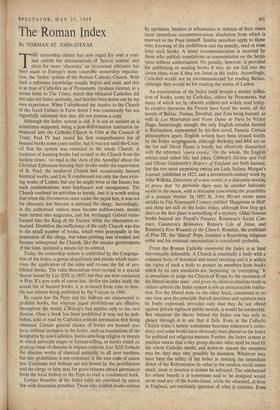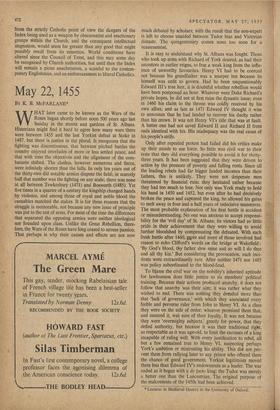The Roman Index
By NORMAN ST. JOHN-STEVAS THE censorship debate has now raged for over a year. and amidst the denunciations of 'horror comics' and pleas for more 'obscenity' an occasional reference has been made to Europe's most venerable censorship organisa- tion, the 'Index' system of the Roman Catholic Church. With such a reference knowledge usually begins and ends, and this is as true of Catholics as of Protestants. Graham Greene, in a recent letter to The Times, stated that educated Catholics did not take thelndex seriously, and this has been borne out by my own experience. When I telephoned my inquiry to the Church of the Jesuit Fathers in Farm Street I was courteously but not regretfully informed that they did not possess a copy.
Although the Index system is old, it is not as ancient as is sometimes supposed, being a post-Reformation institution in- troduced into the Catholic Church in 1564 at the Council of Trent. Paul IV had issued his first comprehensive list of banned books some years earlier, but it was not until the Coun- cil that the system was extended to the whole Church. A tradition of banning books had existed in the Church from the earliest times : we read in the 'Acts of the Apostles' about the Christian Ephesians burning their books under the supervision of St. Paul; the mediwval Church had occasionally banned heretical works, and Leo X condemned not only the then exist- ing works of Luther, but any he might write in the future; but such condemnations were haphazard and unorganised. The Church confined its activities to heresy, and it is worth noting that when the Decameron came under the papal ban, it was not for obscenity but because it satirised the clergy. Accordingly, in the, authorised version nuns became noblewomen, monks were turned into magicians, and the Archangel Gabriel trans- formed into the King of the Fairies, while the obscenities re- mained. Doubtless the inefficiency of the early Church was due to the small number of books, which were principally in the possession of the clergy, but when printing was invented and became widespread the Church, like the secular governments of the time, invented a means for its control.
Today the censorship system is controlled by the Congrega- tion of the Index, a group of cardinals and priests which super- vises the application of the rules and revises the list of pro- hibited books. The rules themselves were revised in a special decree issued by Leo XIII in 1897, but they are now contained in Pius X's new code of canon law. As for the Index itself, the actual list of banned books, it is re-issued from time to time, the last edition being published by the Vatican in 1948.
By canon law the Pope and the bishops are empowered to prohibit books, but whereas papal prohibitions are effective throughout the world, a."15ishop's ban applies only to his own diocese. Once a book has been prohibited it may not be pub- lished, sold or read by Catholics without permission first being obtained: Certain general classes of books are banned ipso facto without incluSion in the Index, such as translations of the Scriptures by non-Catholics, books attacking religion or morals or which advocate magic or fortune-telling, or books which ex professo treat of obscene or impure subjects. Leo XIII forbade the obscene works of classical antiquity to all save teachers, but this prohibition is not contained in the new code of canon law. Cardinals and bishops are not bound by the prohibitions and the clergy or laity may for grave reasons obtain permission from the local bishop or the Pope to read a condemned book.
Certain breaches of the Index rules are punished by canon law with draconian penalties. Those who publish books written by apostates, heretics or schismatics in defence of their views incur immediate excommunication, absolution from which is reserved to the Pope himself. Similar penalties apply to those who, knowing of the prohibition and the penalty, read or eves. keep such books. A lesser excommunication is incurred by those who publish translations or commentaries on the Scrip- tures without authorisation. No penalty, however, is provided for publishing or reading books if they do not fall, into the above class, even if they are listed in the Index. Accordingly, Catholics would not be excommunicated for reading Balzac, although they .would be for reading the works of Luther.
An examination of the Index itself reveals a motley collec- tion of books, some by Catholics, others by Protestants, but many of which are by obscure authors not widely read today. In creative literature the French have fared the worst. all the novels, of Balzac, Dumas, Stendhal, and Zola being banned, as well as Les Miserables and Notre Dame de Paris by Victor Hugo. Surprisingly enough, the only English novelist banned is Richardson, represented by his first novel, Pamela. Certain philosophers apart, English writers have been treated kindly by the Index congresation, although Berkeley and Mill are on the list and David Flume is briefly but effectively dispatched with the reference 'opera °Itlia.' On the whole, the English entries read rather like bad jokes. Gibbon's Decline and Fall and Oliver Goldsmith's History of England are both banned, but the two most surprising entries are Lady Sydney Morgan's Journal, published in 1822, and a seventeenth-century work by John Wilkins, Discovery of a new world or .a discourse tending to prove that 'tis probable there may be another habitable world in the moon, with a discourse concerning the possibility of a passage thither. In 1892 St. John Mivart wrote some articles in The Nineteenth Century entitled 'Happiness in Hell' and these arc still on the Index today, although how they got there in the first place is something of a mystery. Other famous books banned are Pascal's Pensees, Rousseau's Social Con- tract, Casanova's Memoires, Renan's Life of Jesus, and Rosmini's Five Wounds of the Church. Rosmini, the confidant of Pius IX, the 'liberal' Pope, founded a flourishing religious order and his eventual canonisation is considered probable., From the Roman Catholic viewpoint the Index is at least theoretically defensible. A Church is essentially a body with a common body of doctrinal and moral teaching and it is within the rights of such a body to. protect its members from books , which by its own standards are 'depraving' or 'corrupting.' It is unrealistic to judge the Church of Rome by the standards of the liberal secular state : and given its claim to absolute truth in certain spheres the Index system is not an unreasonable institu- tion. For the liberal state on the other hand, committed to no one view save the principle that all doctrines and opinions may be freely expressed, provided only that they do not offend against private rights or public morals, it would be intolerable. But whatever the theory behind the Index one has only to glance through it to see that it fails. Even in the Catholic Church today's heresy sometimes becomes tomorrow's ortho- doxy, and some books have obviously been placed on the Index for political not religious reasons. Further, the Index system in practice means that a tiny group decides what shall be read by the whole Catholic world, and however sincere the members may be, they may very possibly be mistaken. Whatever may have been the utility of the Index in meeting the immediate threat of the Reformation its value in the modern world seems small, since in practice it cannot be enforced. The uneducated for whose benefit it is sometimes said to be designed would never read any of the books listed, while the educated, at least in England, are,resolutely ignorant of what it contains. Even from the strictly Catholic point of view the dangers of the Index being used as a weapon by obscurantist and reactionary groups Within the Church. and the consequent intellectual stagnation, would seem far greater than any good that might possibly result from its retention. World conditions have altered since the Council of Trent, and this may some day be recognised by Church authorities, but until then the Index will remain a pious anachronism, a scandal to the contem- porary Englishman, and an embarrassment to liberal Catholics.



































 Previous page
Previous page